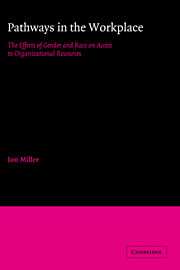4 - Conclusions
Published online by Cambridge University Press: 30 September 2009
Summary
I began this work by contrasting the rationalist conception of how resources and advantages are distributed in organizations with recent perspectives that are critical of the rationalist approach. I used these two opposing sets of assumptions to bracket the range of opinions about what is to be expected in the study of reward allocation mechanisms. My objective has been to see where race and gender differences in informal network integration and access to formal authority fall along this rational–nonrational continuum. The findings have not been simple, nor have they been decisively in favor of any single perspective. Mechanisms generally regarded as rational were operating alongside some that are commonly seen as nonrational, and, moreover, these contrasting sets of mechanisms operated in different ways for different categories of members, and in different ways in the informal and formal arenas. The results were further complicated by the overlap between internal relations and activities located in the extraorganizational environment. Interpreted with appropriate caution, the results provide a good point of reference for speculating about the effects of ascribed status on organizational practices.
The data suggest three general conclusions for the organizations in the present study. All three could reasonably be restated as hypothetical guidelines for future investigations. The first has to do with the relationship between the formal and informal dimensions of activity:
Ways of gaining access to the networks of collegial ties did not resemble the means of gaining access to the formal authority structure.
Informal ties were basically equal by race and gender. Formal connections were not; they varied by gender and were even more strongly affected by race in ways that are not anticipated by theories of organizational or racial stratification.
- Type
- Chapter
- Information
- Pathways in the WorkplaceThe Effects of Gender and Race on Access to Organizational Resources, pp. 83 - 99Publisher: Cambridge University PressPrint publication year: 1986



